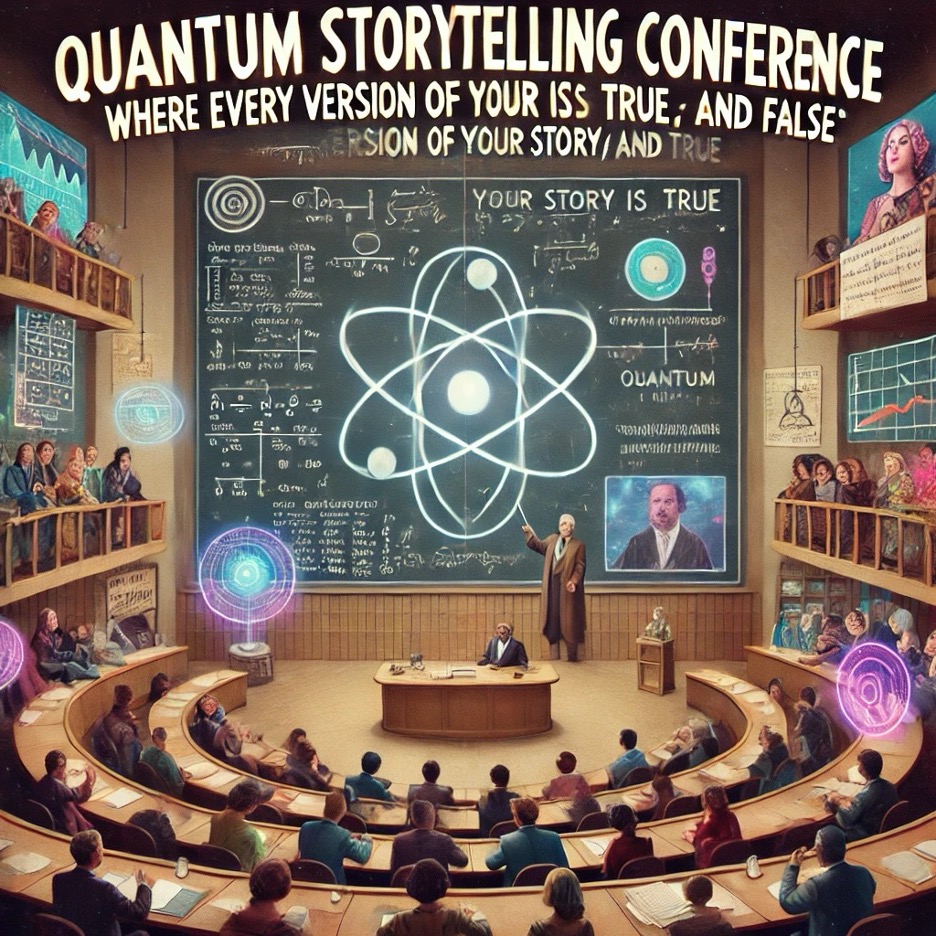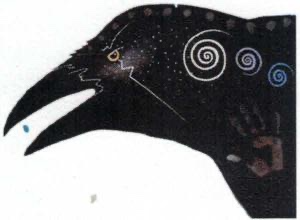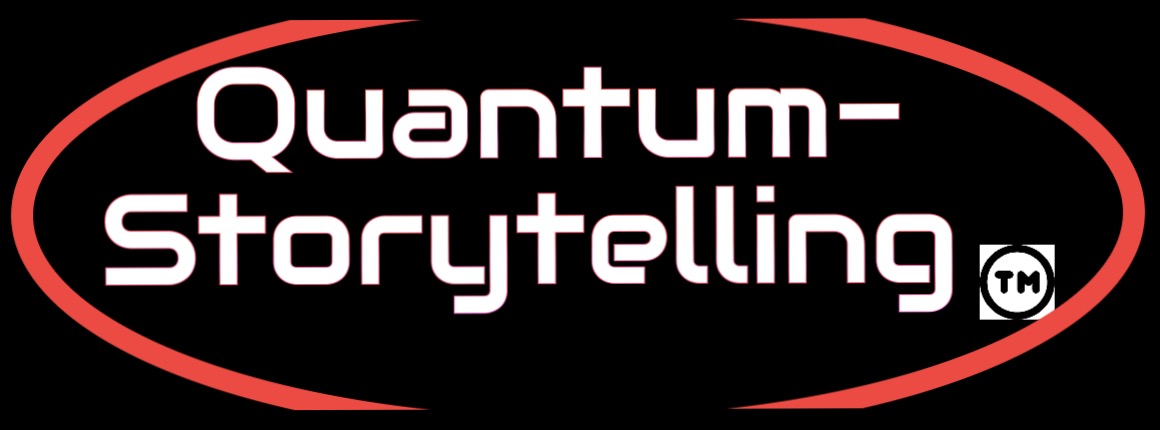QUANTUM STORYTELLING CONFERENCE PROGRAM 2024
December 4-6, 2024 • Las Cruces, New Mexico
Register NowDecember 4-6, 2024 • Las Cruces, New Mexico
Register Now

Art by
Virginia Maria Romero
14th
Annual New
Mexico Quantum
Storytelling Conference
Hybrid
Format, December 15-18, 2024
All times MOUNTAIN TIME ZONE,
Las Cruces, New Mexico
Sponsors:
David Boje & Grace Ann
Rosile &True
Storytelling Institute
David Boje’s
Conference Website:
www.davidboje.com/quantum
For questions
or payments contact Grace
Ann Rosile garosile@nmsu.edu or cell
575-571-0071
LOCATIONS:
December
15, 2024, 2-8pm. Lundeen’s
Inn of the Arts, 618 S
Alameda Blvd, Las Cruces, NM
88005
December
16-18, 2024.
LOCATION: Dona Ana
Community College Workforce
Dev. Ctr, 2345 E. Nevada
(behind Sprouts)
ZOOM LINKS:
Join Zoom
Meeting – Quantum Storytelling
Conference
https://us06web.zoom.us/j/83687709221?pwd=d7RIVkuUtNaaGB0x6IMbCV2h966CsV.1
Meeting ID: 836 8770 9221
Passcode: Quantum
Quick Link https://us06web.zoom.us/j/83687709221?pwd=d7RIVkuUtNaaGB0x6IMbCV2h966CsV.1
Schedule at https://davidboje.com/quantum
|
|
 storytellingreview.org See Online Issue #1 At True Storytelling.org |
|
HOME |
| PUBLICATIONS from
Our Attendees |
12/13/24
UPDATED DRAFT
SCHEDULE - - Please let me
know ASAP if you have a
problem with this schedule! Thanks!
Sunday,
December 15, from 11am-1pm,
Chihauhaun Desert Walk
(half-hour travel each way,
1 hour walking)
Sunday,
December 15, from 1-2pm,
True Storytelling
Pre-Conference Meeting; Also
Farmer’s Market Old Mesilla
Sunday,
December 15, from 2-3pm at
Lundeen’s Inn of the Arts,
Welcome and Opening Drumming
with Yolanda Martinez
Sunday,
December 15, from 3-4pm,
Pre-conference Workshop with
Gerri McCullogh & David
Boje, at Lundeen’s
Sunday,
December 15, from 4-5pm,
Pre-conference at the
outdoor gazebo, David and
Sabine Trafimow, “Connecting
Art and Science”
Sunday,
December 15, 5pm, Dinner at
Lundeen’s, bean with
mushroom burritos, corn
bread, hash browns with
green beans, pie.
NOTE: Use your own
caution and good judgement
regarding masking and
boosters. Outdoor locations
will be used as much as
possible.
December 16,
2024.
LOCATION: Dona Ana
Community College Workforce
Dev. Ctr, 2345 E. Nevada
Ave,575-528-7092.
|
8:30-8:45am |
Doors Open; Coffee, Tea, Fruit, Snacks;
Register/Pay |
All; SEE
ABSTRACTS |
|
8:45-9 |
Welcome (David Boje, Grace Ann Rosile, Don
Pepion) |
David, Grace Ann & Don |
|
9-9:50 |
1-min Biosketch, both zoom and on-site |
All |
|
9:50-10 |
Transition |
All |
|
1
10:00-10:10 |
Joe Gladstone |
Transplanar Wisdom |
|
10:10-10:20 |
Don Pepion |
Ookaan Ceremony & Knowledge |
|
10:20-10:30 |
Conversation between 2 presenters |
|
|
10:30-10:50 |
Q&A |
All |
|
10:50-11:00 |
Transition |
All |
|
2
11:00-11:10 |
Greg Cajete Keynote |
Keynote |
|
11:10-11:20 |
Greg Cajete Keynote |
Keynote |
|
11:20-11:30 |
Conversation with Don & Joe |
Don & Joe |
|
11:30-11:50 |
Q&A |
All |
|
11:50-12:00 |
Transition |
All |
|
3
12:00-12:10 |
Richard
Ng |
Indigenous Economic Development |
|
12:10-12:20 |
Jake Foreman |
Indigenous Economic Development |
|
12:20-12:30 |
Nancy Conrad, CEO, Creative Enterprises |
Creative Enterprises |
|
12:30-12:40 |
Conversation between presenters |
Richard, Jake, and Nancy |
|
12:40-12:50 |
Q&A |
All |
|
12:50-1:00 |
Transition—get bag lunches |
All |
|
1:00-2:00 |
LUNCH bags at Young Park Pond or
indoors |
Book&Art show; on-line breakout
group |
|
4
2:00-2:10 |
Eduardo Barrera Herrera |
Who
Speaks for Fire? Chant
of Dead |
|
2:10-2:20 |
Brian Calliou |
First Indig. In Legal Prof. in Canada |
|
2:20-2:30 |
Conversation between Presenters |
Eduardo and Brian |
|
2:30-2:50 |
Q&A |
All |
|
2:50-3:00 |
Transition |
All |
|
5
3:00-3:10 |
Cora Voyageur |
Indig. Women Leader Stories |
|
3:10-3:20 |
Wanda Tisby-Cousar/MaBondo Kayakoh |
Af. Am. SANDE storytelling |
|
3:20-3:30 |
(Conversation among presenters) |
Cora & Wanda |
|
3:30-3:50 |
Q&A |
All |
|
3:50-4:00 |
Transition |
All |
|
6 4:00-4:10 |
Michel Fortier |
Human “Resources” problems in Mgt |
|
4:10-4:20 |
Claudine Desrosiers |
Multispecies Alliance |
|
4:20-4:30 |
Conversation between presenters |
Michel & Claudine |
|
4:30-4:50 |
Q&A |
All |
|
4:50-5:00 |
Transition: We need to be out of
the building by 5! |
All |
|
5:00-5:45 |
BREAK |
All |
|
5:45-6:05 |
Depart now to Travel 20 min to
Boje/Rosile’s |
4700 Dunn Dr., Las Cruces, NM 88011 |
|
6:00-8:00 |
Dinner at The Game, (Dutch
Treat), 2605 S Espina St, Las Cruces, NM
88001 |
The Game restaurant, outdoor heated
patio https://www.thegamebarandgrill.com/
|
December
17, 2024. LOCATION: Dona Ana
Community College Workforce
Dev. Ctr, 2345 E. Nevada
Ave. 575-528-7092.
|
8:30-8:45am |
Doors Open; Coffee, Tea, Fruit, Snacks;
Register/Pay |
All; note: Masks & Boosters required SEE ABSTRACTS |
|
8:45-9 |
Reflections on Yesterday; |
Betty & Ken ALL |
|
7
9-9:10 |
Eva Ritter |
Storytelling
for Loss and Grief |
|
9:10--9:20 |
Paula Kent |
Autoethnography
on Aging & Place |
|
9:20-9:30: |
Conversation between 2 presenters |
Eva
& Paula |
|
9:30-9:50 |
Q&A |
All |
|
9:50-10:00 |
Transition |
All |
|
8
10:00-10:10 |
Jens Larsen |
Narr. Doctoral Students’ Wellbeing |
|
10:10-10:20 |
Glenn Parry |
Love,
Wisdom, &
Compassion |
|
10:20-10:30 |
Conversation between 2 presenters |
Jens
& Glenn |
|
10:30-10:50 |
Q&A |
All |
|
10:50-11:00 |
Transition |
All |
|
9
11:00-11:10 |
Ditte Marie |
Postcolonial Narr & Ensemble Story |
|
11:10-11:20 |
Kalanguak Absalonsen |
Postcolonial Life Story |
|
11:20-11:30 |
Conversation between 2 presenters |
Ditte Marie and Kalanguak |
|
11:30-11:50 |
Q&A |
All |
|
11:50-12:00 |
Transition |
All |
|
10 12:00-12:10 |
Myra J. Hird Keynote |
Keynote |
|
12:10-12:20 |
Myra J. Hird Keynote |
Keynote |
|
12:20-12:40 |
Q&A |
All |
|
12:40-12:45 |
Transition |
All |
|
12:45-1:45 |
LUNCH:
bag lunch, on site or walk to Young
Park Pond |
All |
|
1:45-2:00 |
Transition—travel back to the
room |
Please be on time! |
|
11 2:00-2:10 |
Gerri McCullogh |
Acoustic
Vital Materialism |
|
2:10-2:20 |
Oscar Montiel Mendez |
Org
Metastasis |
|
2:20-2:30 |
Conversation among presenters |
Gerri and Oscar |
|
2:30-2:50 |
Q&A |
All |
|
2:50-3:00 |
Transition |
All |
|
12
3:00-3:10 |
Jillian Saylors |
Jester’s
Liberation System 3rd
Eye |
|
3:10-3:20 |
Carolyn Gardner |
Obstruction |
|
3:20-3:30 |
Conversation
among presenters |
Jillian, Carolyn |
|
3:30-3:50 |
Q&A |
All |
|
3:50-4:00 |
Transition |
All |
|
13 4:00-4:10 |
Usha Haley & David Boje |
Stories
of Haute Cuisine |
|
4:10-4:20 |
Duncan &
Marie-Claude |
True Storytelling & Antenarrative |
|
4:20-4:30 |
Conversation between presenters |
Usha, David, & Lois |
|
4:30-4:50 |
Q&A |
All |
|
4:50-5:00 |
Transition (plans, logistics,
pairs/groups) |
All |
|
5:00-5:45 |
BREAK |
|
|
5:45-6:00 |
Travel to Rosile-Boje House: 4700
Dunn Dr., L.C.,
88011 |
|
|
6:00-8:00 |
Italian Night: Veg Lasagna,
Pizza,
Broc&Caul, Green
Beans Almond., Choc
Orange B-day Cake,
IceCream Peaches |
Italian Night, plus fire pit and
marshmallow roast |
|
|
|
|
|
|
We are CASUAL. Wear clothing and shoes suitable
for the outdoors and
for the fire pit
where those
activities are
indicated. |
BRING
EXTRA LAYERS TO STAY
WARM FOR DESERT WALKS
AND OUTDOOR MEALS. |
December
18, 2024. LOCATION: Dona Ana
Community College Workforce
Dev. Ctr, 2345 E. Nevada
Ave. 575-528-7092.
|
8:30-8:45am |
Doors Open; Coffee, Tea, Fruit, Snacks;
Register/Pay |
All; note: SEE ABSTRACTS |
|
8:45-9 |
Reflections on Yesterday |
Betty & Ken |
|
14 9-9:10 |
Cristiano Frota de Oliveira |
WWOK-IWOK Continuum |
|
9:10-9:20 |
Dominique Besson & Aysylu Valitova |
Quantum
Storytelling Analogies |
|
9:20-9:30 |
Conversation between 2 presenters |
Cristiano, Dominique, & Aysylu |
|
9:30-9:50 |
Q&A |
All |
|
9:50-10:00 |
Transition |
All |
|
15 10:00-10:10 |
Irery Melchor Duran |
Entre. & Insecure Neighborhoods |
|
10:10-10:20 |
Robert Gephart (Bob) |
Risk Sensemaking, Loss/Agency |
|
10:20-10:30 |
Conversation between 2 presenters |
Irery and Bob |
|
10:30-10:50 |
Q&A |
All |
|
10:50-11:00 |
Transition |
All |
|
16 11:00-11:10 |
Artem Mushin-Makedonskiy |
Storytelling Consulting: Results |
|
11:10-11:20 |
Betty Beeler |
Bahktin |
|
11:20-11:40 |
Conversation between presenters |
Artem & Betty |
|
11:40-11:50 |
Q&A |
All |
|
11:50-12:00 |
Transition |
All |
|
17 12:00-12:10 |
Kenneth Molbjerg-Jorgensen et al |
Love
and Hannah Arendt |
|
12:10-12:20 |
Glenn & Kenneth |
|
|
12:20-12:30 |
Conversation among presenters |
Usha, David, and Lois |
|
12:30-12:50 |
Q&A |
All |
|
12:50-1:00 |
Transition |
All |
|
1:00-2:00 |
LUNCH bags inside, or at Young
Park next to the
lake |
All, weather permitting |
|
18 2:00-2:10 |
Peter Egebjerg-Rantzau |
Co-Creating Leadership for Social Ch |
|
2:10-2:20 |
Jim Sibel |
Co-Creating
Leadership |
|
2:20-2:30 |
Conversation among presenters |
Peter & Jim |
|
2:30-2:50 |
Q&A |
All |
|
2:50-3:00 |
Transition |
All |
|
3:00-3:10 |
Ken Long |
Narr.Cog. & Storythinking |
|
3:10-3:20 |
Rohny Saylors |
Deradical. for
online brain rot |
|
3:20-3:30 |
Conversation between presenters |
Ken & Rohny |
|
3:30-3:50 |
Q&A |
All |
|
3:50-4:00 |
Transition |
All |
|
19
4:00-4:10 |
Oscar
Edwards |
Quantum Af. Am. Story & Networks |
|
4:10-4:20 |
Grace Ann Rosile |
Horse Embodied Story-PostConf Thu |
|
4:20-4:40 |
WRAP-UP FINAL THOUGHTS |
All |
|
4:40-4:50 |
Plan next year; post-conf.
sessions; Anton
Shufutinsky |
Plan; OSR Journal |
|
4:50-5:00 |
Transition---we must be out of
the building by 5pm! |
All; visit New Mexico places! |
|
20
5:00-5:30 |
5:00-5:30
-----BREAK
-------5:00-5:30 |
|
|
5:30-6:00 |
Transition: Travel to Boje/Rosile’s
house |
4700 Dunn Dr., Las Cruces, NM 88011 |
|
6:00-8:00 |
Dinner on your own, or leftovers
at Rosile/Boje house |
|
December
19, 2024. LOCATION: as
indicated below.
|
10-12 or noon-2 |
HorseSense post-conf in LC and/or at Caballo
Lake |
Grace Ann |
|
|
City of Rocks – 1 hour west of L.C. |
|
|
|
White Sands – 1 hour east of L.C. |
|
|
|
Old Mesilla: 20 min west from
conference site |
|
|
|
Dripping Springs – 10 min east of
campus |
|
